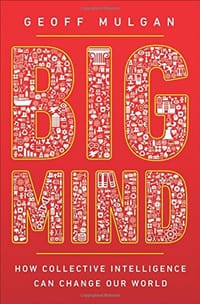A new field of collective intelligence has emerged in the last few years, prompted by a wave of digital technologies that make it possible for organizations and societies to think at large scale. This “bigger mind”―human and machine capabilities working together―has the potential to solve the great challenges of our time. So why do smart technologies not automatically lead to smart results? Gathering insights from diverse fields, including philosophy, computer science, and biology, Big Mind reveals how collective intelligence can guide corporations, governments, universities, and societies to make the most of human brains and digital technologies.
Geoff Mulgan explores how collective intelligence has to be consciously organized and orchestrated in order to harness its powers. He looks at recent experiments mobilizing millions of people to solve problems, and at groundbreaking technology like Google Maps and Dove satellites. He also considers why organizations full of smart people and machines can make foolish mistakes―from investment banks losing billions to intelligence agencies misjudging geopolitical events―and shows how to avoid them.
Highlighting differences between environments that stimulate intelligence and those that blunt it, Mulgan shows how human and machine intelligence could solve challenges in business, climate change, democracy, and public health. But for that to happen we’ll need radically new professions, institutions, and ways of thinking.
Informed by the latest work on data, web platforms, and artificial intelligence, Big Mind shows how collective intelligence could help us survive and thrive.
周若刚,英国社会创新之父;英国首相战略办公室顾问;目前是英国国家科学、技术及艺术基金会首席执行官,伦敦政治经济学院、伦敦大学客座教授。多次访问中国,并就应对国际金融危机、社会创新、智慧城市等问题进行演讲。

